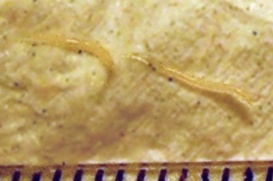Pinworm infection
(Redirected from Pinworms)
Editor-In-Chief: Prab R Tumpati, MD
Obesity, Sleep & Internal medicine
Founder, WikiMD Wellnesspedia &
W8MD medical weight loss NYC and sleep center NYC
| Pinworm infection | |
|---|---|
| Synonyms | Enterobiasis, oxyuriasis |
| Pronounce | N/A |
| Specialty | N/A |
| Symptoms | Itching around the anus, disturbed sleep |
| Complications | Urinary tract infection, appendicitis |
| Onset | 1–2 months after exposure |
| Duration | Can persist for weeks to months if untreated |
| Types | N/A |
| Causes | Enterobius vermicularis (pinworm) |
| Risks | Children, crowded living conditions |
| Diagnosis | Tape test, microscopic examination |
| Differential diagnosis | Anal itching from other causes, hemorrhoids |
| Prevention | Hand washing, hygiene |
| Treatment | Mebendazole, albendazole, pyrantel pamoate |
| Medication | N/A |
| Prognosis | N/A |
| Frequency | Common in children worldwide |
| Deaths | N/A |
Pinworm infection, also scientifically referred to as enterobiasis, is a parasitic infection caused by the pinworm, or Enterobius vermicularis[1]. This infection is one of the most common types of human parasitic diseases, particularly in temperate regions.
Epidemiology and Life Cycle[edit | edit source]
Pinworm infections are ubiquitous worldwide and affect all demographics, but they are especially prevalent in school-aged children. The parasite's eggs can survive on a variety of surfaces, facilitating transmission from person-to-person, particularly in a close-living environment[2].
The life cycle of the pinworm begins with the ingestion of microscopic pinworm eggs. Once inside the host's body, the eggs hatch in the small intestine and mature as they move towards the colon. The mature females migrate to the perianal region, primarily at night, where they lay their eggs, thus triggering itchiness and further spreading the infection.
Symptoms and Diagnosis[edit | edit source]
The most distinctive symptom of pinworm infection is perianal pruritus, or itching in the anal area, especially during nighttime. This itching is due to the presence of the mature female worms and their eggs. Besides causing discomfort and sleep disturbances, this symptom can also contribute to secondary bacterial infections due to persistent scratching[3]. However, not all infected individuals exhibit symptoms. Asymptomatic carriers play a significant role in spreading the infection unknowingly, emphasizing the importance of preventive measures and regular checkups in populations at risk.
Diagnosis of pinworm infection typically involves the "tape test," which involves applying adhesive tape to the perianal area upon waking up in the morning, then examining the tape under a microscope for the presence of eggs[4].
Treatment[edit | edit source]
Effective treatment of pinworm infection generally involves oral medications that kill the parasites, such as mebendazole and albendazole. Due to the highly contagious nature of the disease and the likelihood of re-infection, it's often recommended to treat all household members or other close contacts[5]. In addition to medical treatment, maintaining good personal hygiene, including regular handwashing, cleaning bed linens and undergarments, and avoiding scratching the anal area, can help prevent the spread and recurrence of the infection.
References[edit | edit source]
- ↑ Pinworm Infection FAQs(link). Centers for Disease Control and Prevention (CDC). Accessed 2023-06-19.
- ↑ Enterobius Vermicularis (Pinworm)(link). U.S. National Library of Medicine. Accessed 2023-06-19.
- ↑ Pinworm infection - Symptoms and causes(link). Mayo Clinic. Accessed 2023-06-19.
- ↑ Pinworm Infection Diagnosis(link). Centers for Disease Control and Prevention (CDC). Accessed 2023-06-19.
- ↑ Enterobiasis (pinworm infection)(link). World Health Organization. Accessed 2023-06-19.
| This article is a medical stub. You can help WikiMD by expanding it! | |
|---|---|
| Parasitic disease caused by helminthiases | ||||
|---|---|---|---|---|
|
Search WikiMD
Ad.Tired of being Overweight? Try W8MD's physician weight loss program.
Semaglutide (Ozempic / Wegovy and Tirzepatide (Mounjaro / Zepbound) available.
Advertise on WikiMD
|
WikiMD's Wellness Encyclopedia |
| Let Food Be Thy Medicine Medicine Thy Food - Hippocrates |
Translate this page: - East Asian
中文,
日本,
한국어,
South Asian
हिन्दी,
தமிழ்,
తెలుగు,
Urdu,
ಕನ್ನಡ,
Southeast Asian
Indonesian,
Vietnamese,
Thai,
မြန်မာဘာသာ,
বাংলা
European
español,
Deutsch,
français,
Greek,
português do Brasil,
polski,
română,
русский,
Nederlands,
norsk,
svenska,
suomi,
Italian
Middle Eastern & African
عربى,
Turkish,
Persian,
Hebrew,
Afrikaans,
isiZulu,
Kiswahili,
Other
Bulgarian,
Hungarian,
Czech,
Swedish,
മലയാളം,
मराठी,
ਪੰਜਾਬੀ,
ગુજરાતી,
Portuguese,
Ukrainian
Medical Disclaimer: WikiMD is not a substitute for professional medical advice. The information on WikiMD is provided as an information resource only, may be incorrect, outdated or misleading, and is not to be used or relied on for any diagnostic or treatment purposes. Please consult your health care provider before making any healthcare decisions or for guidance about a specific medical condition. WikiMD expressly disclaims responsibility, and shall have no liability, for any damages, loss, injury, or liability whatsoever suffered as a result of your reliance on the information contained in this site. By visiting this site you agree to the foregoing terms and conditions, which may from time to time be changed or supplemented by WikiMD. If you do not agree to the foregoing terms and conditions, you should not enter or use this site. See full disclaimer.
Credits:Most images are courtesy of Wikimedia commons, and templates, categories Wikipedia, licensed under CC BY SA or similar.
Contributors: Prab R. Tumpati, MD






